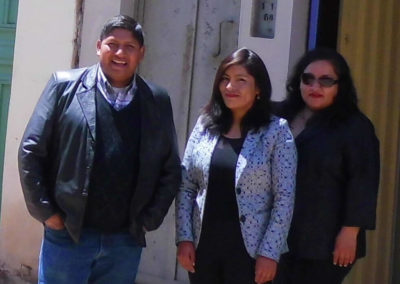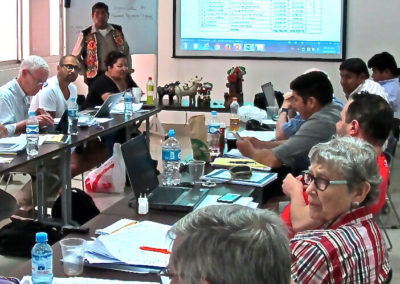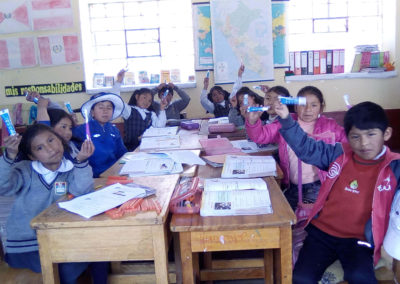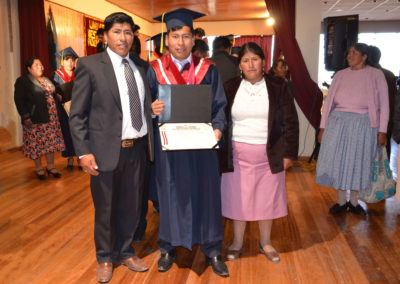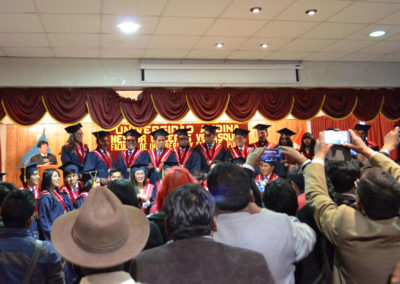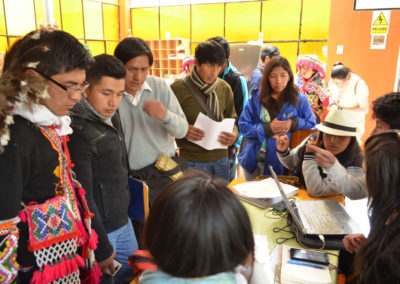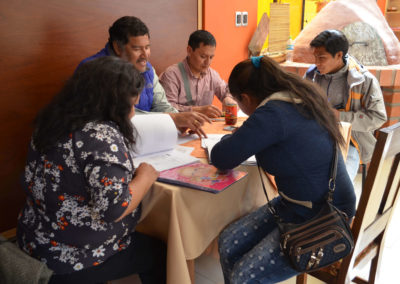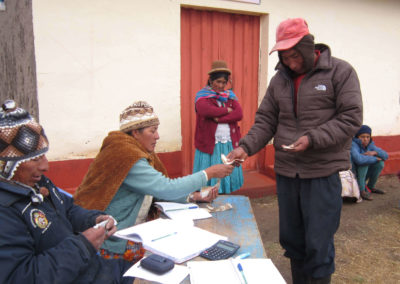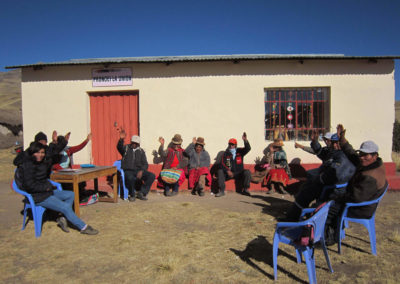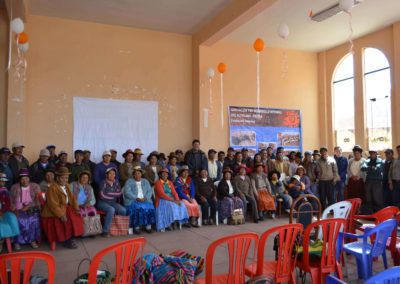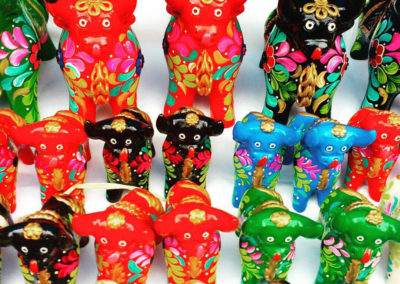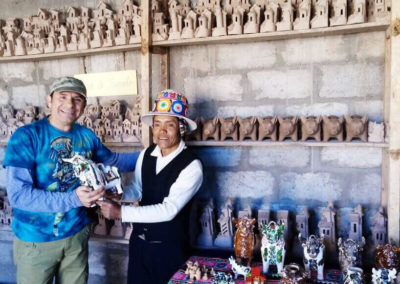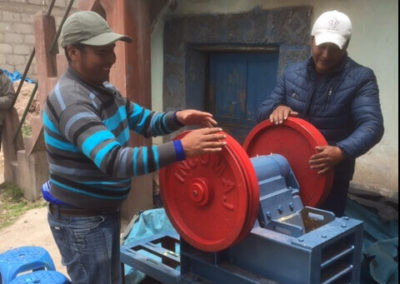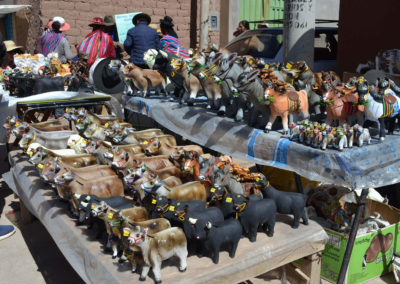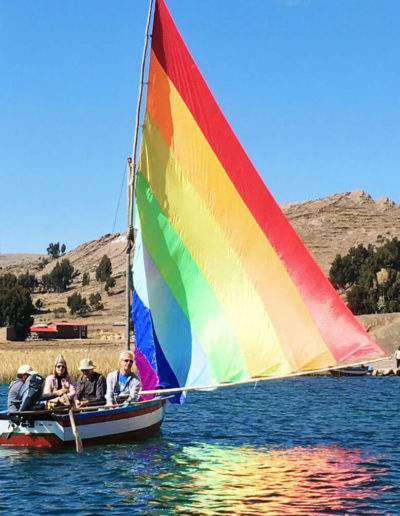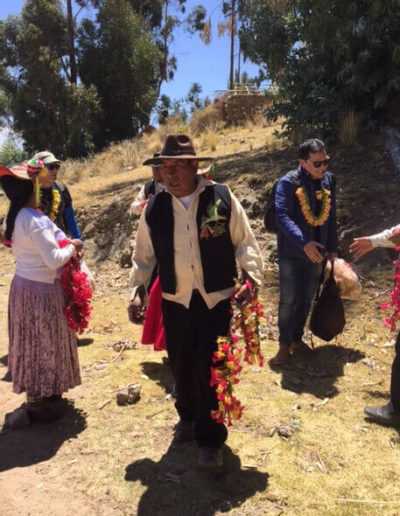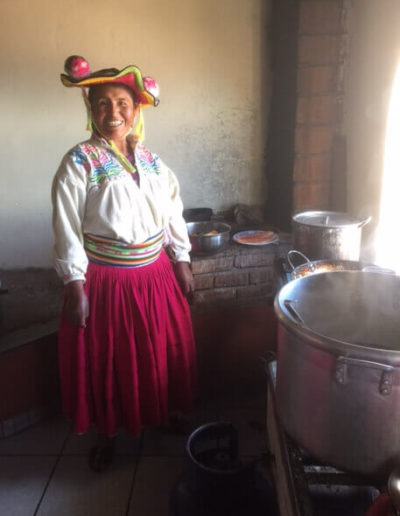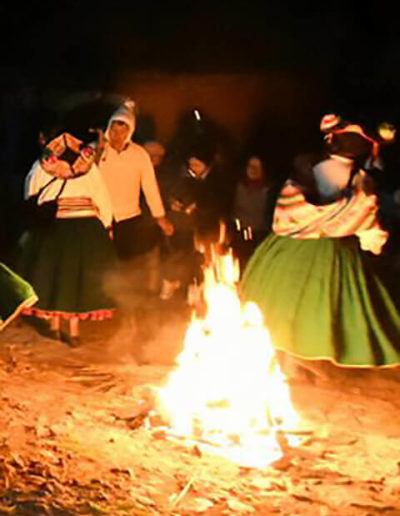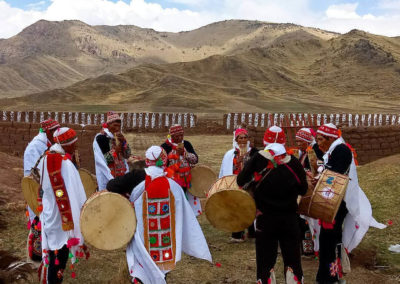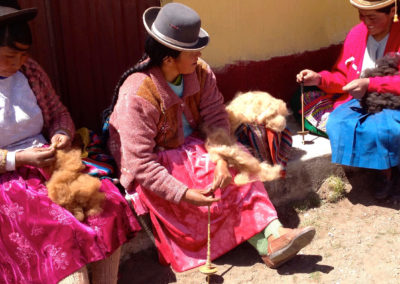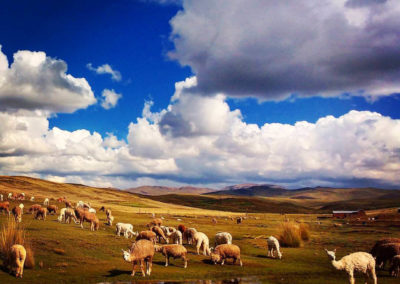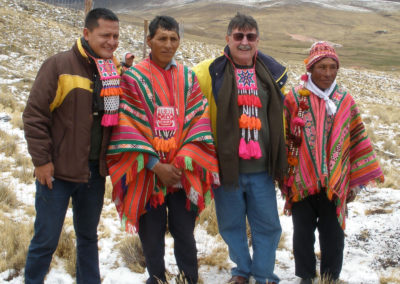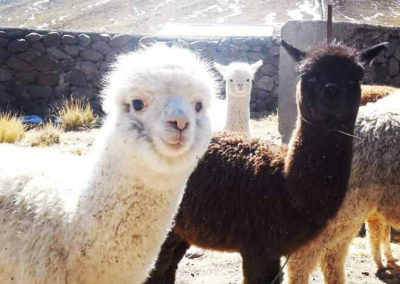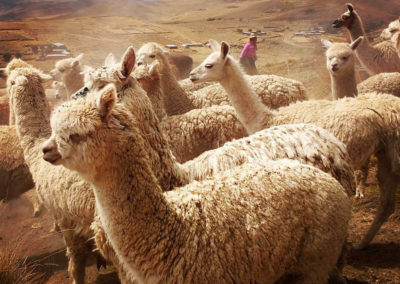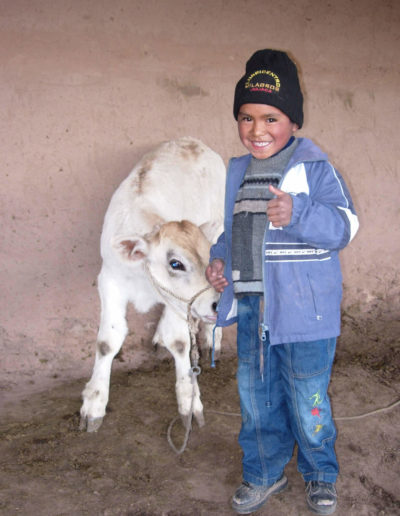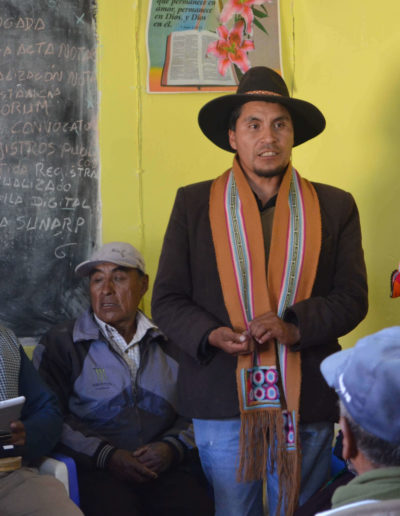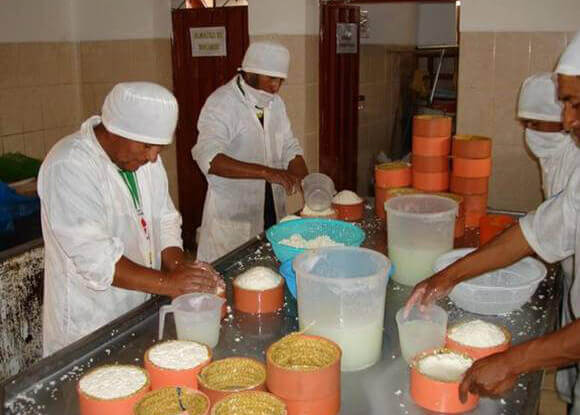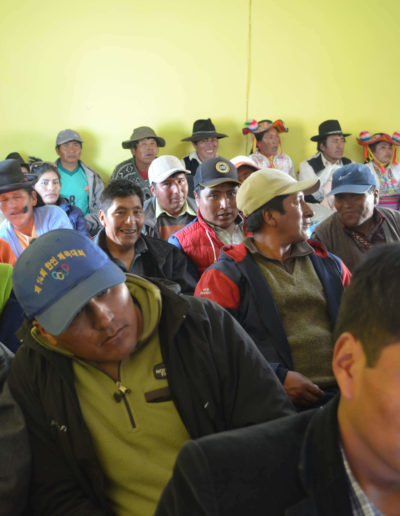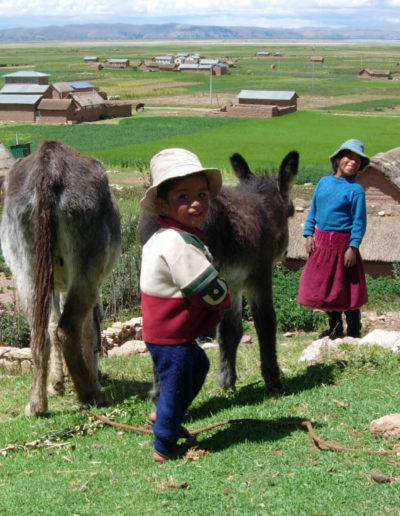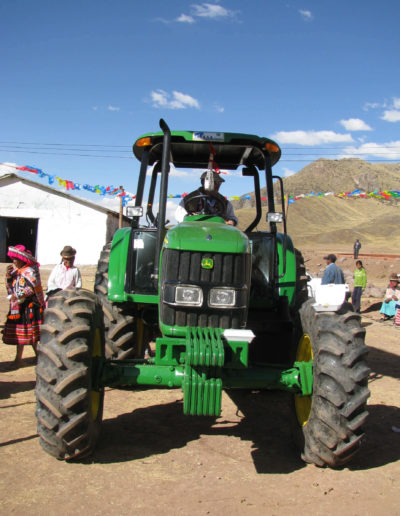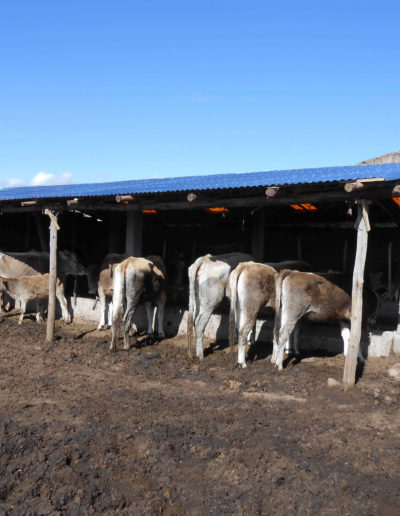Dedicated to Ending Extreme Poverty in the Peruvian Highland Villages
The Chijnaya Foundation was established in 2005 in response to a request from the rural community of Chijnaya to collaborate on projects to improve living conditions. Learning by word of mouth of the successes in Chijnaya, people throughout the Altiplano come to ask us to work with their villages as well.
A Few Basic Principles Guide The Chijnaya Foundation Approach:
- We believe that success depends on in-depth knowledge of the local context;
- We respect the traditional culture of the Quechua people with whom we partner;
- We stress the importance of local initiative, with a focus on community and democratic participation;
- We work to enhance leadership and organizational skills and to fortify community self-reliance;
- We believe that positive results require project monitoring and long term follow up; and finally,
- We advocate integrated development with multiple concurrent projects in each community in the areas
of health, education and income-generating economic activities.
Our Initiatives to Ending Extreme Poverty in the Peruvian Highland Villages
Projects are proposed by the communities and, if approved by the Foundation’s board, are implemented with the participation of our three Peruvian staff members who work out of a small office located in the town of Pucará in Lampa Province. The Foundation’s Board of Directors carefully evaluates the feasibility of each project submitted for consideration. All Officers and Board members of the Foundation are dedicated volunteers who donate their time and money, receiving no monetary compensation for their services. Our sustained contact with the people in our network of communities means that we work intensively with our partners, earning their trust and friendship.
The Oral Health Program
Recognizing the significance of oral health for a person’s overall lifetime health, the Foundation sponsors a dental program, providing dental services to people in our network of communities. Our staff dentist, Dr. Madelca Aragon, makes regular visits to the communities to treat patients with caries or other dental problems, to provide periodic fluoride treatments for children in schools, and to teach children how to maintain oral health. A recent examination of grade school kids in one village indicated the need for a more intensive program because of the high prevalence of caries in the children who were examined. Consequently, our goal is to have volunteer dentists conduct one comprehensive campaign each month in 2018. To carry out this program we need additional funding to purchase more portable dental equipment and to pay for necessary materials. Please consider donating to this initiative!
The Smoke-Free Stoves Program
When we accept a new community into our network, one of the first projects involves training in the construction of smoke-free stoves and access to small loans from the rotating community fund to pay for metal parts. Traditional Andean cooking is done in highly polluted kitchens with extreme smoke density from open fires. This environment is extremely unhealthy, leading to respiratory illnesses and damage to vision. The low-cost new stoves dramatically reduce exposure to indoor pollution, especially for women and children. In the past, we encountered problems with the durability of metal chimneys in this harsh environment. A change in chimney design solved the problem, and we replaced the defective ones. When something goes wrong with a project, we are there, and we fix it!
The Scholarship Program for Rural Youth
Access to a college education for the children of Andean farmers and herders is a recent phenomenon in the region. The people in our communities place a strong value on education and have high aspirations for their sons and daughters. They are willing to make major sacrifices to achieve their goals. But with incomes of less than two dollars per day per person, families find it difficult to provide enough money to pay for college. They need our help.
The Groups Savings Program
A major component in the Foundation’s efforts to enhance family incomes involves the creation of rotating funds in our communities, essential capital for implementing projects to increase production. But in addition, we sponsor a program to encourage farmers, herders and artisans to form savings groups. Each month the members of a group contribute to their fund. This money is then available to a member to finance an individual project. In rural areas of the Altiplano, financial institutions such as banks and credit unions are absent or weak and generally unavailable to villagers with whom we work. Rosmery Montesinos, our staff member responsible for this program, has been successful in forming savings groups and in teaching people how to manage their funds. The photos illustrate this program in action—receiving and recording the contributions and discussing the uses of these savings.
The Access to Clean Water Program – A New Initiative
Access to sufficient quantities of water of adequate quality is a serious problem worldwide. Our communities are no exception. In all our communities, water is scarce; in many of them water quality is poor, with high levels of contamination. To address these problems, we have embarked on an exciting partnership with Water Charity, a global nonprofit organization specializing in water and sanitation issues. In community meetings with representatives of Water Charity, community members explained the urgent need to solve problems of water scarcity and quality. Our communities have begun to prepare proposals for projects to be considered for funding. These include water for irrigation to increase agricultural production, wells to provide water for human and animal consumption, and storage tanks and water capture systems. Water Charity has committed to funding ten projects. If we receive more than ten feasible proposals, we will need additional funds for this program.
The Artisan Development Program
Some communities in the region where we work have made ceramic products since before the Inca conquest of the Altiplano. They are especially noted for the iconic “Toro de Pucará”, known throughout Peru for its beauty and rich symbolism. In some communities artisan work is a major source of family income. The Foundation works with two artisan associations in the Province of Azángaro to increase production capabilities and to adopt technology that protects the artisans against occupational health hazards. With the rotating funds created by the Foundation, these artisans have built workshops to enable them to work during the rainy season, and they have designed and constructed an innovative piece of machinery to make the firing process safer. In addition, they have acquired machinery to grind materials used in ceramic production, replacing the slow and tedious manual labor previously employed.
The Rural Tourism Program
Tourism is a major sector of the Peruvian economy, and homestays in rural villages have become popular. Ccotos is a community on the shore of Lake Titicaca. A more beautiful place would be hard to find. Tourism provides a secondary source of income for the potato farmers of Ccotos. The Foundation currently partners with two tourism associations in the village to improve the lodging facilities they offer to visitors. With loans from the rotating funds established by the Foundation, families who belong to these associations have purchased blankets and sheets and kitchen and dining room equipment, and they have improved the sanitary facilities available to the tourists. These improvements have helped to attract more visitors and to charge higher prices for the experience. Hosts not only provide food and lodging to guests but also entertainment—traditional dances and music, hiking, sailing, and fishing and the opportunity to learn first-hand about traditional Andean life. The contact is greatly beneficial for both tourists and hosts.
The Alpaca Herding Communities Program
The Foundation works with five alpaca herding communities in the Province of Lampa. Living at altitudes of more than 14,000 feet above sea level, the herders maintain a traditional culture that dates back to Peru’s Inca past, a national treasure as part of Peru’s pre-colonial heritage. Their ancient ayarachi music and costumes are hauntingly beautiful. But human and cultural survival in this extreme environment is precarious, and finding solutions to the poverty experienced by the herders is difficult. Their livelihood is based on selling what they produce, alpaca fibre and meat, in order to buy foods grown in agricultural communities at lower elevations, namely potatoes, corn, oca, and quinua.
In cooperation with the Nuñoa Project, an American nonprofit focused on improving the lives of alpaca herders, the Foundation has implemented programs to improve economic conditions in these isolated communities. Our approach is multifaceted and includes the following components:
- An alpaca breeding program aimed at improving the genetic stock of the herds;
- A program to recover the diversity of natural fleece colors in alpaca herds;
- Instruction in better herd management techniques;
- A vaccination program to reduce the high rates of morbidity and mortality;
- The establishment of a handspun alpaca yarn industry to provide another income source;
- Regular visits by Peruvian and American veterinarians to assess progress on these projects;
- The acquisition of portable sheds to protect baby alpacas from adverse weather and predators and thereby reduce the high mortality rate of young alpacas (a program aided by Engineers without Borders of Utah State University).
The herding communities, of course, also participate in our health and education initiatives.
Please Support Our Work with a Generous Contribution
Learning by word of mouth of the successes in Chijnaya, people throughout the Altiplano come to ask us to work with their villages as well. We now work in 26 remote communities in the mountains of southern Peru. With more funding, we could help many more needy communities in the region.
The Agricultural Development and Rotating Funds Program
Lack of access to capital is a major barrier to ending poverty in rural communities. Even when credit is available, exorbitant interest rates and collateral requirements make it impossible for farmers to obtain loans. The Foundation places a high priority on improving the economic condition of farm families on the Altiplano. To address the issue of inadequate access to funds for projects aimed at increasing agricultural production, the Foundation pioneered a form of microfinance adapted to the Andean cultural context.
As part of our integrated approach to development, the Foundation creates rotating funds that are owned and administered by the communities. Each year the community lends funds to 10-20 families for a specific kind of project; at the end of the year, those borrowers repay the loans and a new set of families then borrows for that year’s project. Interest rates are low and determined by the community. Jhuver Aguirre, our projects director, advises communities on the management of the rotating funds, whose loan repayment rate is over 98%.
Milk and cheese production are the economic mainstays in most of our communities, and funds have been used primarily to increase milk production. Investments in animal sheds, feeding troughs, milking stations, increased forage crop production, artificial insemination, and community cheese factories have doubled or even tripled the cash income of families in our communities in a short time. Almost 2,000 loans have been extended and repaid, and the total amount of capital in the rotating funds is now over $180,000.
With more communities clamoring to partner with the Foundation, we accept two or three new communities per year when our donors provide enough support. And when our old communities propose excellent new projects requiring more resources, we add to their existing rotating funds. The Foundation has arranged some private loans between individual supporters and communities for the purchase of agricultural equipment (tractors and hay balers). These loans are repaid to the lender.
Please support this program with a generous donation! This is truly a gift that keeps on giving! Your contribution produces results year after year!
The Chijnaya Foundation Visitors “Tours”
Proud of our accomplishments, we delight in taking donors and friends to our communities to meet the farmers and herders and to witness personally the impact of our projects in the lives of families in “our” communities. “Tours” in 2017 included people from Belgium, Norway, Peru and the United States, seen below with members of an artisan association in the town of José Domingo Choquehuanca. These encounters are superb learning experiences for both visitors and villagers. Here are comments from recent visitors:
Kudos to Dr. Ralph Bolton and his team for putting together a once-in-a-lifetime visit to the Altiplano of Peru. We were deeply touched by each of the communities we visited where we heard from community leaders and enjoyed their warm hospitality. We were especially pleased to formulate a plan to implement projects to bring clean water to communities served by The Chijnaya Foundation.
The hands-on approach of the staff members is without doubt extremely effective in resolving community issues. Villagers proudly showed us their products and progress. It was so much fun being part of this experience. Thanks very much to the Foundation and Pro-DIA for their excellent work.
Please Support Our Work with a Generous Contribution
Learning by word of mouth of the successes in Chijnaya, people throughout the Altiplano come to ask us to work with their villages as well. We now work in 26 remote communities in the mountains of southern Peru. With more funding, we could help many more needy communities in the region.


